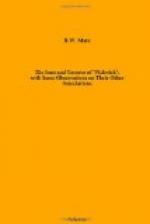On their way back to the inn, Mr. Pickwick made that great discovery “which had been the pride and boast of his friends, and the envy of every antiquarian in this or any other country,” of a small broken stone, partially buried in the ground in front of a cottage door, which, as everybody knows, bore the inscription:
— | —
B I L S T
U M
P S H I
S.M.
A R K
The exultation and joy of the Pickwickians knew no bounds and they carefully carried the important stone into the inn, where Mr. Pickwick’s eyes sparkled with a delight as he sat and gloated over the treasure he had discovered, the detailed adventure with which need not be related here. Having carefully packed his prize, its discovery and the happy meeting were duly celebrated in an evening of festivity and conversation.
“It was past 11 o’clock—a late hour for the little village of Cobham—when Mr. Pickwick retired to the bedroom which had been prepared for his reception. He threw open the lattice-window, and, setting his light upon the table, fell into a train of meditation on the hurried events of the two preceding days.
“The hour and the place were both favourable to contemplation; Mr. Pickwick was roused by the church clock striking twelve. The first stroke of the hour sounded solemnly in his ear, but when the bell ceased the stillness seemed insupportable; he almost felt as if he had lost a companion. He was nervous and excited; and hastily undressing himself, and placing his light in the chimney, got into bed.”
But Mr. Pickwick could not sleep following the excitement of the day’s adventure, so “after half an hour’s tumbling about, he came to the unsatisfactory conclusion that it was of no use trying to sleep, so he got up and partially dressed himself. Anything, he thought, was better than lying there fancying all kinds of horrors. He looked out of the window—it was very dark. He walked about the room—it was very lonely.”
Suddenly he thought of The Madman’s Manuscript which he had brought from Dingley Dell, and, trimming his light, he put on his spectacles and composed himself to read that blood-curdling narrative. On reaching the end, Mr. Pickwick’s candle “went suddenly out” and he once more scrambled into bed.
Next morning, with the coveted antiquarian treasure, the four gentlemen travelled to London by coach.
That is the story of the association of the “Leather Bottle,” Cobham, with The Pickwick Papers, which has spread its fame to the uttermost parts of the world. That is the chief reason why in certain seasons of the year the “Leather Bottle” and Cobham are visited by thousands of admirers of the novelist, and also why the ideal Kentish village has become a magnet to lovers of England’s rural lanes and arable fields; but the charm of it all is that when it is reached both it and the inn are to be found exactly as Dickens so faithfully described them many years ago.




